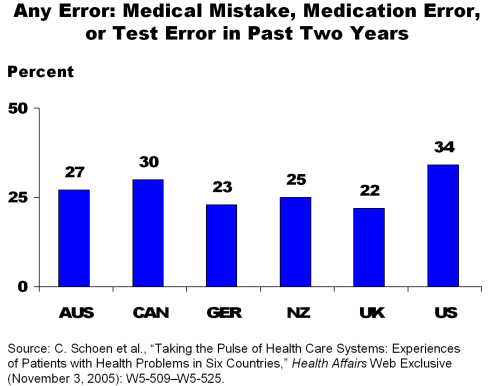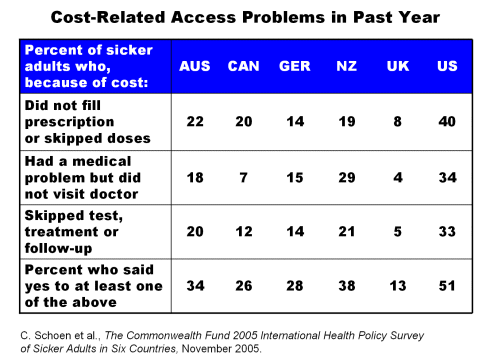Patients judge their health care on a number of different levels—ease of access, affordability, safety, responsiveness, and coordination, as well as health outcomes. Their views provide a window onto the front lines of care.
The eighth in The Commonwealth Fund's series of international health policy surveys, which explored the experiences of "sicker" adults in the United States and five other industrialized countries, reveals disturbing news about access to care and quality of services delivered to people who have recently been hospitalized, had surgery, or reported health problems. Once again, the U.S. stands apart from the pack in the failures of its health care system.
According to a November Health Affairs article about the survey, one-third of U.S. patients with health problems said they had experienced medical mistakes, medication errors, or inaccurate or delayed lab results—the highest rate of any of the six nations surveyed, which also included Australia, Canada, New Zealand, the United Kingdom, the United States, and—for the first time—Germany. While sicker patients in all countries reported safety risks, poor care coordination, and inadequate chronic care treatment, the U.S. stood out for high error rates, inefficient coordination of care, and high out-of-pocket costs that deterred people from getting treatment.

Still, the survey's findings did not show that any one nation performed best or worst overall. "There were many symptoms of poorly coordinated care in every country, regardless of the type of delivery or financing system," said Cathy Schoen, a senior vice president at The Commonwealth Fund and the article's lead author. "Shortfalls were particularly evident for people when discharged from the hospital, and for patients seeing multiple physicians." Schoen called these patients "the 'canary in the coal mine' of any health system."
According to the survey, more than one of four hospital patients in each country (from 28% to 32%) said that medical risks were not completely explained to them, and nearly one of five or more (17% to 26%) reported inadequate pain management. At least one-third of patients in each country said that, before leaving the hospital, they had not received instructions about symptoms to watch for, did not know whom to contact with questions, or had made no arrangements for follow-up care.
While much attention has been given to improving hospital safety, the survey found that medical errors often happen outside the hospital setting, as part of lab or diagnostic care. In addition, one-third or more of chronically ill patients in all countries reported that their doctor had not created a plan to help them manage their conditions.
As in past studies, U.S. patients reported higher out-of-pocket costs and greater barriers to care than patients in other countries. Half of U.S. patients said that they did not see a doctor when sick, did not get recommended treatment, or did not fill a prescription because of costs—all signs, the researchers said, of inadequate insurance coverage and fragmented care.

Commenting on the results, Fund president Karen Davis noted that "while the consistently high error rates and lack of coordination are disturbing, the findings also highlight the potential for each country to improve." Davis recently participated in the Fund's eighth annual International Symposium on Health Care Policy in Washington, D.C., where senior government officials and health policy experts from each of the countries were briefed on the findings and discussed ways to improve health system responsiveness, quality, and access, including innovations planned or already under way.